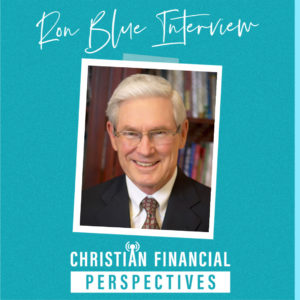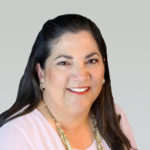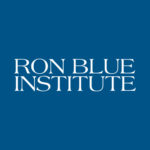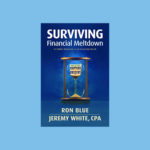Click below to listen to Episode 68 – Ron Blue Interview
Subscribe: Apple Podcasts | Google Podcasts | Spotify | Amazon Music | Stitcher | RSS | More
Ron Blue Interview
Bob and Mary Jo interview very special guest, Ron Blue. Ron is the president and founder of Kingdom Advisors, as well as the founder of The Ron Blue Institute which “delivers biblically-based financial wisdom to the body of Christ by providing thought leadership and content through church, professional, consumer, and academic channels.” Kingdom Advisors is a ministry that empowers Christian financial advisors who seek to integrate a biblical worldview into their advice and counsel. He has authored 18 books including:
- Biblical Financial Planning
- God Owns It All
- Faith Based Family Finances
- Surviving Financial Meltdown
Listen in as we dive into what motivated Ron to get into the Biblical financial planning movement, the amazing Christian leaders he met along the way, and his plans for Kingdom Advisors as this incredible organization continues to grow.
We also wanted to offer to our listeners a copy of Ron Blue’s “Simplifying The Money Conversation – Four H’s of Financial Wisdom”. Just give Christian Financial Advisors a call at (830) 609-6986 or email us at info@ciswealth.com
GUESTS: Ron Blue, Founder of Kingdom Advisors and The Ron Blue Institute
HOSTED BY: Bob Barber, CWS®, CKA® and Mary Jo Lyons, CFP®, CKA®
Mentioned In This Episode
Want to ask a question about your specific situation? Schedule a complimentary 15 minute phone call.
EPISODE TRANSCRIPT
[INTRODUCTION]
Bob: Welcome to Christian Financial Perspectives, a weekly podcast where we talk about ways to integrate your faith with your finances. This is Bob Barber.
Mary Jo: And I’m Mary Jo Lyons.
Bob: Are you ready to learn how to apply biblical wisdom to everyday financial decisions?
Mary Jo: Join us as we look at integrating your faith with your finances. If it’s your first time listening, welcome to our podcast, and if you’re a returning listener, welcome back.
[EPISODE]
Mary Jo: In Colossians 3:23-24, “Work willingly at whatever you do as though you are working for the Lord rather than for people. Remember that the Lord will give you an inheritance as your reward and that the master you are serving is Christ.”
Bob: Oh, Mary Jo. We have such a special guest today on Christian Financial Perspectives – Mr Ron Blue. If anybody has spent his entire working years aligning with that scripture you just read as working for the Lord, it’s Ron. Ron is the founder of Kingdom Advisors, something that’s so close to our hearts, a ministry that empowers over 2,700 Christian financial advisors to integrate a biblical worldview into their advice and counsel and we’ve both been members of Kingdom Advisors for a while and we’re Certified Kingdom Advisors. We talk about that a lot on the podcast. In 1979, Ron founded Ronald Blue and Company. Now Ronald Blue Trust, which today is the largest Christian financial planning firm in the country with over $8 billion under management. That’s a B. That’s a billion. That’s quite a bit. He has authored 18 books including “Master Your Money”, “The Complete Guide to Faith Based Family Finances”, and “Surviving Financial Meltdown”. And I’ve read many of his books. A few years ago, he started the Ron Blue Institute for Financial Planning at Indiana Wesleyan University to help change the way Christians think, act, and communicate about financial stewardship, empowering the church, and changing the world. Ron holds a bachelor’s degree and a master’s from Indiana University and is married to Judy and they have five grown children and 13 – count that up – 13 grandchildren. That must be fun. Ron and Judy live in Atlanta, Georgia and many of you might remember hearing Ron many times, as I did, on the radio as a guest to Focus On The Family with Dr. James Dobson, FamilyLife Today with Dennis Rainey, and Money Matters with the late Larry Burkett that was such a mentor of mine. Oh Ron, welcome to Christian Financial Perspectives. We are so excited to have you.
Ron Blue: Well Bob, I appreciate, very much, that very kind introduction. I guess when you get as old as I do, you can put some things down. I appreciate you, Bob, and I remember when we met and I remember walking together, I think we were in Virginia or Norfolk, Virginia.
Bob: Yeah, that’s right.
Ron Blue: And talking about faith-based family finances, and now I’ve watched over, golly it’s been at least 20 years, you develop your practice and it’s such a joy to see how God has used you in a significant way in his kingdom. And I’m just delighted to be able to participate with you. So thank you for asking.
Bob: Thank you, Ron. We’re quite excited about it and honored to have you on as well.
Ron Blue: Well, I’m looking forward to it.
Mary Jo: Ron, when Bob and I first talked about inviting you on to be our guest on Christian Financial Perspectives. We were looking at doing a podcast focusing on “Simplifying The Money Conversation”. We thought it would fit well with the theme of integrating faith and finances. In fact, we liked it so much, we sent it out to all our clients this last year. But then we also realized that there was so much more in your body of work that we wanted to chat about. We want to start first with digging into “Simplifying The Money Conversation”, which is really just a conversation guide. And you start off in the guide by stating you how you want folks to handle their money from a competent place, empowered by biblical financial wisdom. And I think this is such a powerful statement. Can you tell us more about that and how you were inspired to start there?
Ron Blue: Well, the simplifying little booklet we developed, it actually began only four or five years ago when I was asked if I could develop some curriculum for Christian high school students. My daughter, Karen, had been a teacher and knew how to write curriculum. So she wrote six weeks of curriculum that we could put into a Bible program in one of the classes and choosing Bible was because there was so much Bible behind finances and it was a required course and we wanted everybody to have it.
Mary Jo: That would be great. It should be required across the country.
Ron Blue: Well, we’re trying. We’re in about a hundred high schools now.
Mary Jo: We need to get into the public schools, if possible. So that would be really good.
Ron Blue: Well, we could go down that track because it would be possible. Here’s what I found over my career. I’ve been in the financial services world for 52 years and I started on Wall Street and what I found is that everything that is good in the financial world will have its roots in the Bible, in biblical financial wisdom. And when we got done developing the curriculum, I looked at it and I said, that is the essence of everything I’ve been trying to teach over the last 4 years. And we called it simplifying because when you get right down to it, a biblical worldview approach to money is really, really simple. People don’t understand that and they don’t believe that. And one of the reasons they don’t believe that is that they don’t believe in the authority of scripture. But given the authority of scripture, developing a biblical worldview approach will work at any level of financial need. And I found that because it would work at any level, you know, all you had to do is to teach the principles. And I built the business that the Lord allowed me to start on the fact that God’s word speaks to finances and it speaks authoritatively and it works. And now that company, I was over there not long ago, they have actually over 10 billion in assets and 10,000 clients, and those clients are giving about $150 million a year to evangelical causes. And that was my original vision. Now, my vision is this isn’t so hard. It can be taught very, very easily. And that simplifying booklet is our attempt to teach the authority and the simplicity of God’s word when it comes to money and money management. So that’s a long answer, but that’s how it all got started. That’s how that book got started.
Mary Jo: Well, it may have simple in the title, but I don’t think there’s anything really that simple about it. And we all, even us older folks, need things simplified, not just the fifth graders.
Bob: That’s right. In this booklet, you’ve got the money conversation, it brings together the four H’s of financial confidence. And you list this as heart, health, habits, and hope. Can you talk about how you see these four principles as the foundation for every financial decision?
Ron Blue: Yeah, I can. And the four H’s is a framework, and it’s a framework for thinking. So the first thing that happens in behavioral change is you have to have some exposure, some knowledge, and then you begin to think about that, develop a conviction, and that conviction results in action. So, that’s kind of the fundamental learning model, teaching model, in it. But the four H’s is really a very simple, every behavior begins with the heart. So that’s one of the H’s. Money reveals a heart, and it’s an entry into the heart. There’s a lot said about money because it is the competitor to God for our heart. So, the heart is the beginning place and it drives your behavior, what you believe will drive your behavior. I was testifying before congressional subcommittee a number of years ago and the Senator asked me what I would tell the American family and I said, “Senator, I would tell them to spend less than they earn, avoid the use of debt, build some liquidity or merging into their finances and set some longterm goals so that they could prioritize their spending between the short term and the long term.” And he said to me, he said, “Well, that seems to me that would work at any income level.” And I said, “You’re right, Senator, including the United States government.”
Bob: [LAUGHS]
Ron Blue: Well if you look at that, those four, and if you add to that give generously. Those are the five money management principles that you use to manage your money. There really aren’t any other. I’ve got to live within my income. I’ve got to avoid debt. I’ve got to build some liquidity. I’ve got to save for the future. I’ve got to pay off my debt and pay off my taxes. And what I just recited was the five uses of money. So there’s heart, and then the habits are the habits of management, and the five uses of money is really a picture of your financial health and you can take your income. You know what your income is. You can look at your tax return, see what your charitable giving is. You can see what your taxes are. Most people know what they’re spending on consumer debt and what they’re saving. And so you have four out of the five uses of money, almost anybody can get that in just 30 minutes by looking at your tax return and doing a little bit of analysis of your finances. Well, when you put that into a pie chart and express it as percentages, it shows you your priorities. It’s a picture of your priorities. It’s a picture of your financial health. And that’s not very difficult. That’s why I say it’s simple. Heart determines behavior. Habits determines how you allocate your money according to your priorities and the pie chart pictures your priorities. And then when you manage your money with the habits to affect the priorities that you want, that gives you the hope factor. So that’s the four H’s – heart, health, habits, and hope. And that’s why I say it’s simple. It’s simple to see. Obviously, it’s difficult to work out and you work it out by faith. But that’s the four H’s, and you can use that as a guide and you can also use it as a communication tool. I’ve found this very effective to help people understand what their priorities are and then what they need to change in order to get to where they want to be.
Mary Jo: So simple in and of itself, but it all fits together. It’s definitely like a puzzle. Money, it’s such a tough topic to discuss in any relationship, certainly between spouses and even with our kids and especially even also with our parents because they’ve lived a long life and they have their same hopes and dreams and habits and all of that. But we have to understand what their wishes are. So a very important topic that can be hard to kind of break that ice sometimes. But the conversations, they’re so very important. Can you share some insight with our listeners that could help them navigate these challenging conversations?
Ron Blue: Yeah. Let’s just take the husband and wife conversation. I spoke at the American Association of Christian Counselors a number of weeks ago, and there were 7,000 counselors there. And when I asked the question, you know, how many of you deal with money in your counseling situations? Now, just about 100% of the hands go up, but money conversations and conflict with money are really symptomatic of something else, and that is symptomatic of the inability to communicate. Because if you take two people, put them in one checkbook, you’re bound to have some type of conflict. It can be constructive conflict or destructive conflict. This tool that we develop, you can take that simplifying booklet and look at just one page of the four H’s and now you can talk about that as a husband and wife and you can look at your priorities and agree on your priorities rather than argue about how you spend money or how you don’t spend money. So the conversation needs to be around priorities rather than the spending habits. You know, one of the funniest things that happened to me early in my career was I was counseling with an older couple and the man said, “Vida, the problem is you’re spending too much money.” And she didn’t even hesitate. She said, “Clarence, the problem is you’re under depositing.” That illustrates the kind of the conflict of two value systems. So a husband and wife’s conversations around priorities will help avoid some of the conflict that can come with money. Secondly, I was asked by a man not too long ago, he said, “How do you teach your children to manage money?” And the Lord gave me some wisdom and I said to him, without really thinking, I said, “Well, first of all, more is caught than taught.” So they’re going to do what you do. You’re teaching them just by the habits that you have. Secondly, you learn to manage money by managing money. The real issue today is children don’t manage money. They manage credit cards. And so somehow, parents have got to tie back to the spending that’s on those credit cards as a conversation. And the other thing is that parents have got to realize that mistakes and poor decisions and poor judgment is how you learn. So you can’t save them from the mistakes that you’re going to make. What you want to do is you want to teach them through the mistakes that they’re going to make. And mistakes are just a great opportunity to teach children. So those are just a couple of thoughts relative to husband and wife and parents and children.
Bob: Ron, you want to come over here and give me some counsel? I’m listening, you know, that the conversation should be around priorities, not the actual what you’re spending. I mean, and I wrote that quote down, “You learn to manage money by managing money, not credit cards.” I mean that’s good stuff there. You know, what else do we need? I mean, we got it right here, you know, more is caught than taught, you know? Okay. Parents.
Mary Jo: So as I sit here recording this and I’m looking around my office and my husband has only part of his baseball cap collection hanging on one of the walls in here and there’s probably 35 of them. So, that’s really more about priorities rather than spending.
Bob: By the way, Ron always pick on Mike. This is a big joke on our podcast. We pick on Mary Jo’s husband, Mike. We pick on him constantly. So, poor Mike. Now he’s the brunt of too many hats.
Ron Blue: Hey, you know what, though, there’s a point there and here’s the point. Well, you may not like the point, but the point I’m going to make is that when you take those four uses of money that I mentioned, you’re giving your taxes, your debt, and your savings. What’s left is what you’re spending on your lifestyle. Now, that’s not living expenses. Living expenses are only a part of the lifestyle expenses. So you’re really evidencing lifestyle with that particular piece of the pie. And that’s okay. God said he gives us richly all things to enjoy, including baseball caps. So.
Bob: You know, Ron, people will know that have been listening to our podcast for awhile, our loyal listeners, we mention this live, give, owe, grow. By the way, all of y’all that are listening, this comes from Ron, we got Ron on right now and he’s the one that that came up with this idea because it just simplifies everything and we’re always going to owe at least taxes. It just simplifies so much and something’s got to give. If you’re living on too much, your giving is going to be less or if you owe too much, you may not be able to grow. So, it’s just amazing how all four, you know, I break it down to four, I know owe has two of that. So, it’s basically five, but you came up with this live, give, owe, grow and it just really speaks to me and it speaks to people that sit across the desk from me every day when I mention this. We use that little chart that you have from Kingdom Advisors, and we give it to them. Live, give, owe, grow, and they go, “I’ve never thought about it that way.’
Ron Blue: Well. And that’s really true. And that’s why, again, I’m going to come back to the idea of simplifying because it’s not difficult. If we could convince people, especially pastors, that they know more about money than most wealth advisors because they know the scriptures, but they needed a framework to put those scriptures into. And that’s the reason that I developed that. And that’s been the biggest use of it has been to convince people that they already know more than what they think they know and what they don’t know is found in the Bible and what they do know is found in the Bible. So, that’s why it’s called simplifying. I’ve got to tell you, also, that when I first did the pie chart, I did it for Judy and I, and I just put it in front of her without explanation. It’s been probably five or six years ago now, and she looked at it and she said, “We’re doing okay, aren’t we?” And I said, “I’ve been telling you that for 35 years.” And she said, “Yeah, but it was all on a spreadsheet.” And she said, “I hate Excel.”
Bob: That’s me, Ron, everything’s on a spreadsheet. You know, I’ll show Rachael this spreadsheet and she’s like, man, I don’t relate to that. So this whole time we’ve been talking about this incredible workbook that, like you said, we sent that out to all of our clients at Christian Financial Advisors. And I want to just say, right in the middle of the podcast here, you’ve been hearing us talk about this. If you would like a copy of this workbook, we bought box loads of them when we bought them back when they first came out. We still have a lot of them. We give them out all the time. So if you’re listening to the podcast today and you want to get a copy of this workbook, give us a call at (830) 609-6986 or go to our website at ciswealth.com and send us an email through our website. Again, the phone number is (830) 609-6986 and we’ll get one of these out to you. So Ron, I want to change gears a little bit now. I’m holding in my hand “Master Your Money”, the book that you wrote and the updated version with your son that you did. “Master Your Money” is where it all started with me, with you Ron, because I taught the homebuilders Bible study through FamilyLife that was a version of this. This title has always been intriguing to me because it’s so straightforward. It says “Master Your Money”, and can you give our listeners a high level view of what this book is about and what it covers?
Ron Blue: Yeah. When I started in 1980, 1979 and 80, building a financial planning practice, I didn’t know what I didn’t know and there really wasn’t anything about financial planning at that point. And there certainly was nothing about biblical financial planning. And when I began to listen to Larry Burkett and read his material and know what I had discovered on both Wall Street and with my CPA firm, I began to put it all together. I had to put it together in such a way that it was a replicable. I began hiring people almost immediately when I started the business, and over the first five years, we developed together kind of the model of financial planning. And so the book, it was done at the suggestion of Chuck Swindoll. I was on his board and he wanted me to write. He said you need to write a book. And I said I don’t like to write. I had five unsolicited book contracts on my desk in 1985.
Bob: You say you don’t like to write, but now you have so many books. Wow.
Ron Blue: That’s right. I still don’t like to write. But “Master Your Money” was really a collection of what I was teaching my staff and my clients. And so it was an overview of biblical financial planning and it was intended that once it was released, nobody would ask me any questions anymore cause they were all in the book.
Bob: Didn’t happen.
Ron Blue: It didn’t happen, as you know. So, that was kind of the background of the book. I also followed the Campus Crusade model in that I considered it a work for hire. So, I never took any royalties off of that book. Probably over the first 15 books that I wrote I never took any royalties and they all went into the company. I didn’t even know how many books had been sold. But the book happened to hit at a time by God’s providence when nothing had been written on biblical finance for a number of years. So Focus On The Family featured it. Swindoll featured it. Billy Graham featured it in some of his work, and it got a tremendous amount of distribution. And I like to say what Henry Blackaby said, “I’ll write the book and God will distribute it.” And that’s what happened with “Master Your Money”.
Bob: Amen. And I remember hearing you talk about it so much on all those programs. You know, I was a big Focus On The Family fan. I listened to it every morning on the way to take my kids to school. And I heard so much about it.
Mary Jo: I’d like to talk a little bit about Kingdom Advisors. I know it has certainly changed the way I think about financial advice and planning as a Certified Financial Planner and how I handle money and advice conversations with my clients. I just wanted to ask you, what was your motivation behind starting Kingdom Advisors and where is it today and what’s your vision for it going in the next five to 10 years, Ron?
Ron Blue: The idea behind it, Larry Burkett had a small group of advisors that he would refer radio listeners to, and that group asked me if I would mentor them relative to how you integrated faith into your advice. And so I started doing that with a group of 16 and I found that what I had done was highly replicable. Tony Stinson and I started Kingdom Advisors in 2003. The idea was can we teach others to do what I had been doing for 25 years, and we found that yes, we could. The idea was that we would develop a lot more advisors than the, I don’t know how many I had at the time, maybe 30-40 advisors that worked for me, but we needed a lot more than that because there was a lot of Christians that needed biblical advice. So, God’s blessed us abundantly with 2,700 now. He gave us an opportunity to move our certification training into academia, which gave it academic rigor and credibility. And you ask, where do I see us going? Well, Tony and Rob around here, they say, our objective is 30,000 over the next several years. They don’t put a date on it. And I say, you know what? We need 100,000 right now.
Bob: This will be like a Promise Keepers event one of these days, Ron. You’re going to have to do it in a football stadium.
Ron Blue: Oh, wouldn’t that be a joyful thing?
Bob: Wouldn’t it be amazing? I will say, and Mary Jo, you know, I told you about it when you first came to that first Kingdom Advisors conference, you’re with financial advisors that are praising the Lord and raising their hands in worship and on fire for Jesus. It’s just mind blowing.
Ron Blue: I like that. A stadium event of Certified Kingdom Advisors. Wow.
Mary Jo: Wow. So there is a vision for you.
Ron Blue: There is a vision.
Mary Jo: So Ron, you also started the Ron Blue Institute in partnership with Indiana Wesleyan University a few years ago, and there is a lot of CFP type curriculums out there. I know that’s one of the things that’s talked a lot right now about trying to get the best program out there. How do you see that particular curriculum in relationship to what else is available? And if you would, please just tell our listeners why you did this and what the Institute’s vision and mission is all about.
Ron Blue: Well actually, this is another God thing. We just celebrated the 40 year anniversary of Ronald Blue Trust and I was able to say to those people, you know, none of this was my plan. I look back now and see God’s hand, but it was not my plan. I just kept moving forward and that’s the way it is with the Institute. I didn’t intend to start an Institute. I didn’t even know what an Institute was. In fact, I find out most people don’t. So the provost of Indiana Wesleyan heard me speak and invited me to campus and long story short, they offered to fund a $10 million endowment if I would license my intellectual property to them. And we had really three objectives. One was that we would teach every student in a Christian university a biblical worldview of money. 150,000 students a year graduate from Christian universities, and there’s no biblical finance curriculum in any of them. Well, I won’t say any, but hardly anything exists in that world and nothing that’s transferable. So, that was the number one objective. The second objective was that by moving the material into university, we gave biblical financial wisdom academic credibility. When you think about it, almost all credibility comes out of the universities and all of the professions come out of universities. So for God to open up that door to move biblical financial wisdom into the academic world was huge in terms of the credibility factor. The third thing was that I said I’ll do what you want me to do, but only if we make it available to all Christian universities. And so I’ve been spending my time, really the last five years, visiting with Christian universities and we’re working with about probably 30 universities now with those objectives. Teach every student and move it into your curriculum and then become a thought leader in that world. Now then, the other thing that has happened is when we move the certification into the academic world, we found out there’s almost nothing being taught by Christian universities as far as CFP curriculum.
Mary Jo: That is just awesome. We’re getting a lot of future leaders, but just getting that information out there to the young people, and they weren’t getting it anywhere else. So that’s hope for the future.
Bob: It is, Mary Jo. Yeah. As we grow, we know where we can hire. They’re coming from a biblical worldview versus a secular worldview of finance.
Ron Blue: I was in Houston a couple of months ago and I met with Dr. Sloan, the president of Houston Baptist University, and I had with me a friend and a fellow advisor, Randy Schrader from Houston. And we said to Dr. Sloan, we said, you know, you should be putting out dozens of Certified Financial Planners that also have the CKA designation into the Texas community. So that’s what we’re trying to do right now is to bill CFP/ CKA curriculum into the universities. Help them do that so that we can begin to put out students that have been trained in biblical finance.
Mary Jo: I was in the corporate world for a long time and boy, you did not have those kinds of conversations with clients. And I’m so thankful and blessed to be able to now integrate my faith with the advice that I’m so passionate about. So it’s been a game changer for me.
Bob: It’s really fun to watch, Mary Jo, too, because I know you were with the big firms, the real big firms, we’re not going to name names, but big ones, really big ones, including your husband. Mike was too, and it was fun to watch Mike last year when you came to the Kingdom Advisors event and to just see such a different perspective that so many financial planners for so many years have never seen. It’s fun to see. And Ron, thank you for that.
Ron Blue: It’s been my joy. I’ve had a very, very blessed life to be involved in kingdom work and now seeing the fruit of it and I’m 77 years old, so I’ve lived to see a lot of all of this come to fruition, but we’re just beginning – really just beginning.
Mary Jo: And you’re still a youngster.
Bob: Amen.
Ron Blue: Well, I can still walk.
Bob: We want to thank you for being on the podcast today. It has been a lot of fun having you on and hearing this wisdom from many years. You know, Ron, I listened to you so many times, like I said, on Focus On The Family and FamilyLife Today with Dennis Rainey. I was a big Larry Burkett fan. I got to admit, I’d be a little nervous if I had Dobson or Rainey call me today and one of them say hey, I want you to come be on my program. As a CPA that you are, before we end the program, I wanted to ask you this question. What was it like as a CPA, financial advisor being asked by Dobson, I mean, I know these are just men. I mean I understand that, but did you ever get nervous before you went on Focus On The Family?
Ron Blue: No, I really didn’t because this was never about me. It was always about what God had taught me. So my focus was always on, you know, let the words of my mouth and the meditation of my heart be acceptable. I did have an opportunity to know a lot of Christian leaders, and I learned a lot from them. You know, I learned vision from Bill Bright. I was on the Campus Crusade board for 25 years.
Bob: Oh wow. Bill was such an amazing, humble man.
Ron Blue: And visionary. It was not uncommon for me to get a telephone call from Bill and say, you know, we got this thing going someplace, and you know a lot of rich people. We need $1 million. Can you go find $1 million for us? He always said, you know, money follows ministry and we’ve been ministering for about 30 years, so where’s the money? He had such big vision, and it wasn’t the money. It was the consequences of spending the money. Chuck Colson, I got to know Chuck well, and Chuck said to me one time something that really changed the way I did a lot of things. He said do what only you can do. And when you think about building a business, there’s so much that you can do. But if you ask the question, is there somebody else that can do this, then you’ve got the opportunity to train somebody else. And Howie Hendricks was a mentor of mine and he said, God did not give you a spouse to frustrate you, but to complete you. I’ve never forgotten that.
Bob: All of these men you’ve mentioned, Ron, were such mentors to me, you know, Chuck Colson and Chuck Swindoll and Bill Bright and Dennis Rainey and Dr. Dobson, all those men. I would love to just hang out with them because I love how they’ve stood by biblical worldview all these years. And some of them have gone on to be with the Lord like Bill and Chuck, but man, I can’t wait to be in heaven with them.
Ron Blue: Well, we’ve seen some giants and there’s another set of giants that’s on the stage today.
Bob: That’s right.
Ron Blue: Dobson said to me one time, where are the future leaders? And I said, Jim, I don’t know, but I know that God knows.
Bob: That’s right.
Mary Jo: Thank you, Ron, again, for taking time out of your busy schedule to be the guest on Christian Financial Perspectives. I’d like to leave our listeners with a quote from our conversation guide that I just love – “Connecting your faith journey with your financial journey makes way for God to use your finances to mold your heart and life to treasure him more.” It’s so important to both Bob and I that our listeners know that we’re here for them to serve them with biblical financial advice week after week. And if you’d like a copy of the workbook Ron wrote and spoke of on today’s podcast called “Simplifying The Money Conversation”, please visit us on the web at ciswealth.com and we’ll get you a free copy.
Ron Blue: Well, thank you for what you’re doing. I sure appreciate both of you.
[CONCLUSION]
Mary Jo: You’ve been listening to Christian Financial Perspectives. Join us next week as we explore more about how to apply biblical wisdom to your financial situations.
Bob: To make sure you don’t miss any of our podcasts, you can subscribe to Christian Financial Perspectives on iTunes, Google Play, or Stitcher. To learn more about integrating your faith with your finances, visit out website at ciswealth.com or call 830-609-6986.
Mary Jo: That’s all for now until next week.
[DISCLOSURES]
Comments from today’s show are for informational purposes only and not to be considered investment advice or recommendations to buy or sell any company that may have been mentioned or discussed. The opinions expressed are solely those of the hosts, Bob Barber and Mary Jo Lyons. Bob and Mary Jo do not provide tax advice and encourage you to seek guidance from a tax professional. Investment advisory services offered through Christian Investment Advisors Inc. DBA Christian Financial Advisors, a registered investment advisor.



















